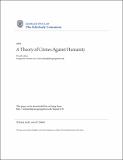| dc.contributor.author |
David Luban |
| dc.coverage.spatial |
Estados Unidos |
| dc.date.accessioned |
2016-01-07T15:20:39Z |
| dc.date.available |
2016-01-07T15:20:39Z |
| dc.identifier.uri |
http://desa1.cejamericas.org:8080/handle/2015/420 |
| dc.description.abstract |
The answer I offer in this Article is that crimes against humanity assault one particular aspect of human being, namely our character as political animals. We are creatures whose nature compels us to live socially, but who cannot do so without artificial political organization that inevitably poses threats to our well-being, and, at the limit, to our very survival. Crimes against humanity represent the worst of those threats; they are the limiting case of politics gone cancerous. Precisely because we cannot live without politics, we exist under the permanent threat that politics will turn cancerous and the indispensable institutions of organized political life will destroy us. That is why all humankind shares an interest in repressing these crimes. The theory that I aim to defend here consists of two propositions: (i) that humanity in the label crimes against humanity refers to our nature as political animals, and (ii) that these crimes pose a universal threat that all humankind shares an interest in repressing. |
| dc.description.abstract |
Reseña: The answer I offer in this Article is that crimes against humanity assault one particular aspect of human being, namely our character as political animals. We are creatures whose nature compels us to live socially, but who cannot do so without artificial political organization that inevitably poses threats to our well-being, and, at the limit, to our very survival. Crimes against humanity represent the worst of those threats; they are the limiting case of politics gone cancerous. Precisely because we cannot live without politics, we exist under the permanent threat that politics will turn cancerous and the indispensable institutions of organized political life will destroy us. That is why all humankind shares an interest in repressing these crimes. The theory that I aim to defend here consists of two propositions: (i) that "humanity" in the label "crimes against humanity" refers to our nature as political animals, and (ii) that these crimes pose a universal threat that all humankind shares an interest in repressing. |
| dc.language.iso |
Inglés |
| dc.title |
A Theory of Crimes Against Humanity |
| dc.ceja.source |
Fuente: <a href="http://scholarship.law.georgetown.edu/cgi/viewcontent.cgi?article=1165&context=facpub" target="_blank">http://scholarship.law.georgetown.edu/cgi/viewcontent.cgi?article=1165&context=facpub</a> |

